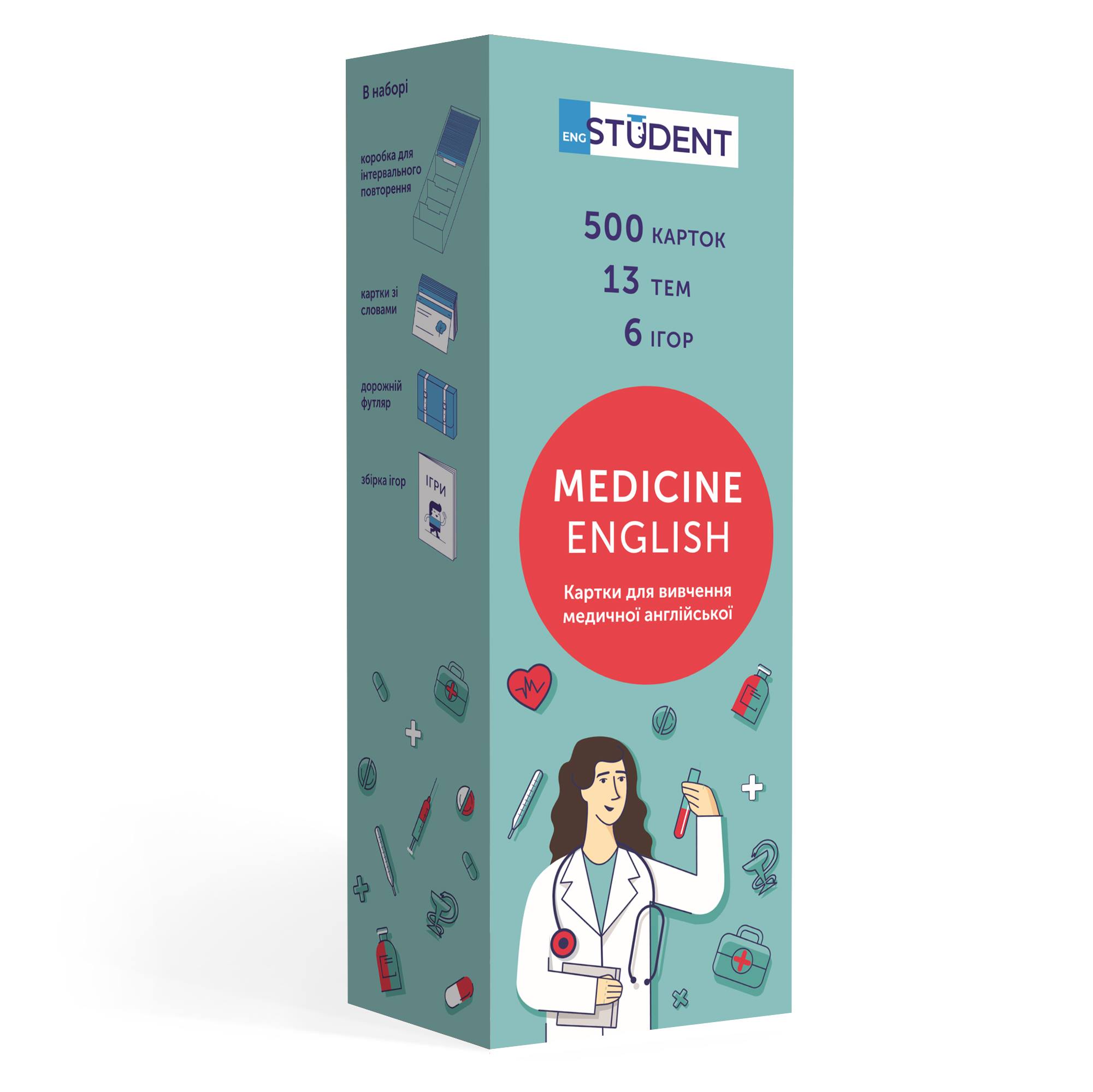Learning medical English: where and how to learn specialised vocabulary
Oleksandra Kulish
Book expert
English for medical professionals is a life-saving skill. It opens doors to international conferences, scientific research, internships at leading clinics around the world, and even job opportunities abroad. However, medical English significantly differs from general English. It is filled with complex terminology, Latin borrowings, and specific phraseology that must be properly understood and used. The difference between general and medical English is explained by many English language textbooks for adults. They help you learn English without particular difficulties. We suggest that you take a closer look at where and how it is best to study specialized vocabulary, and how to improve doctors’ understanding of English. This article will also help you understand what to choose: online or offline learning, or how to combine them with each other.

Which textbooks to choose for studying medical English
Studying specialized textbooks is useful for doctors, medical students, and translators. It is especially important for those who plan to work abroad, as fluency in English is a key requirement for career advancement in the medical field.
You improve your knowledge of terminology and enhance your communication skills. Learning English vocabulary and grammar is much easier with prepared dictionaries and materials. Here are several helpful publications:
- Oxford Handbook of Medical Terminology — a guide with essential medical terms.
- English for Medical Students — a textbook for medical faculty students.
- Medical English for Healthcare Professionals — a book that helps doctors improve communication with patients.
- Cambridge English for Nursing — a specialized course for nurses and caregivers.
- The Medicine Book — a book that explains the most important milestones in the history of medicine, with witty illustrations to help understand complex concepts.
It’s also worth paying attention to medical English dictionaries:
- Dorland’s Illustrated Medical Dictionary — contains comprehensive explanations and illustrations.
- Stedman’s Medical Dictionary — includes accurate definitions and phonetic transcriptions to improve pronunciation.
- Mosby’s Medical Dictionary — a modern dictionary with usage examples for practicing dialogues.
Regular reading of such books helps to quickly grasp complex medical terms, learn how to construct sentences correctly, and reach a high level of language proficiency. To retain the material, it’s important to actively use new vocabulary in practice. Speak with colleagues who are also learning English, build dialogues in your head, and don’t be afraid to make mistakes. The key is persistence and the willingness to take action.
What news resources and blogs are available for doctors
Medical news and blogs provide access to the most up-to-date information. The reason is simple — most medical studies and articles are initially published in English. Even Ukrainian-speaking doctors publish articles in English to expand their audience and draw attention to important topics. This guarantees hundreds or even thousands of views.
Thanks to such materials, doctors stay informed about the latest treatment methods, international standards, and recommendations. You discover innovations, improve your diagnostic techniques, and enhance your professional vocabulary and communication skills with colleagues from other countries.
Regularly reading the following resources offers medical professionals numerous benefits — improving knowledge, exchanging experiences, and making the best clinical decisions:
- Medscape — news, research, and clinical guidelines;
- The New England Journal of Medicine — cutting-edge scientific discoveries and reviews;
- Journal of the American Medical Association (JAMA) — research, reviews, and case studies;
- The Lancet — one of the most authoritative medical journals in the world;
- KevinMD — personal experiences of doctors, real cases, and discussions;
- MedPage Today — daily news and analysis of clinical cases;
- Science-Based Medicine — a critical view on modern medicine;
- Dr. Smith’s ECG Blog — a blog for those who want to dive deeper into ECG interpretation;
- British Medical Journal (BMJ) — one of the most reputable medical journals globally.
These sources not only expand your vocabulary but also help you stay up to date with the latest developments in the field.
What offline and online courses exist for medical English
Medical English courses are an effective way to improve your knowledge and skills for working in the international medical field, as well as a way to memorize medical terms. They help you learn specific terminology, develop the ability to communicate with patients and colleagues, and understand foreign medical research. The advantage of offline courses lies in direct interaction with the teacher and classmates. Online courses, in turn, provide the opportunity to study at a convenient pace and from anywhere in the world.
Trusted courses:
- Coursera: English for Healthcare Professionals — a course from U.S. universities focused on clinical communication.
- FutureLearn: English for Healthcare — training by King’s College London for doctors, nurses, and pharmacists.
- Udemy: Medical English for Healthcare Professionals — includes video lessons and exercises to learn professional vocabulary.
- Offline courses at language schools — many educational centers offer specialized programs for medical professionals.
- Cambridge English: Occupational English Test (OET) Preparation — a specialized test and courses for doctors planning to work abroad.
When choosing a course, it is worth paying attention to the availability of practical tasks and the possibility of communication with native speakers. It does not matter whether you need OET for working abroad (or other courses) in your case — completing it will significantly raise your language level.

How Thematic Videos and Podcasts Benefit Medical Professionals
Thematic videos and podcasts are cool tools for improving medical English. Doctors receive up-to-date information, improve their language skills, and learn about the latest achievements in medicine by listening to experienced specialists. Listeners can also find out whether a doctor should prepare for IELTS or whether OET is a better option. Here are some advantages of such resources:
- Improved pronunciation and listening skills. Watching videos and listening to podcasts helps get used to medical terminology in natural speech. It develops not only listening comprehension but also pronunciation—especially in situations where doctors communicate with patients or colleagues from other countries. Immersion through listening enhances the ability to perceive and use medical terms correctly in conversation.
- Relevant and practical information. Podcasts and videos are an excellent way to learn about the latest medical news, new research, clinical practices, and innovations. Interviews with experts, doctors, and scientists provide not just theoretical knowledge but also practical advice based on real medical cases. This is especially important for physicians who want to stay updated on international medical practices.
- Flexibility and accessibility. Podcasts and videos can be watched or listened to at any time—on the way to work, during workouts, or during breaks. This helps doctors make effective use of their time to improve their language skills, even if they can’t attend courses or training sessions.
- Diverse content. There are numerous thematic podcasts and videos dedicated to various medical fields—from general practice to specialized topics like cardiology, neurology, or psychiatry. The variety is vast, so every medical professional can find content that is highly relevant to their field.
- Development of critical thinking skills. Videos and podcasts often explore medical topics from different perspectives, helping listeners evaluate different approaches to treatment and diagnosis.
Also, check out these helpful resources:
- PodMed — a podcast covering a wide range of medical topics from clinical practices to medical innovations.
- The Clinical Problem Solvers — a podcast that helps doctors develop diagnostic and treatment skills.
- MedCram — videos that explain complex medical concepts in an easy-to-understand format.
- The Health Care Podcast — discussions on current issues and trends in healthcare.
- TED Talks on medicine — lectures by leading doctors and scientists on current medical topics.
With such resources, medical professionals can significantly improve their English, gain new skills, and stay up-to-date with the latest developments in medicine, which is crucial for their careers.
Tips for Learning Medical English Through Movies and TV Shows
Movies and TV shows offer an opportunity to immerse yourself in real medical situations, hear natural speech, expand your vocabulary, and improve listening comprehension. Here are some tips on how to use films and series to study medical English:
- To study medical terminology, it's important to choose content where medicine is a central theme. Series like *Grey's Anatomy*, *House M.D.*, *ER*, or *The Good Doctor* often feature dialogues between doctors, patients, and medical staff, helping viewers practice professional vocabulary in realistic situations.
- Watch with subtitles. For better understanding, watch shows or films with English subtitles. This not only improves listening skills but also familiarizes you with the spelling of terms you hear. When you don’t understand a word or phrase, you can refer to the subtitles for clarification, making the learning process more effective.
- Pause and write down new words. While watching, write down unfamiliar medical terms and phrases. Later, look up their meanings to better understand the context and use them in conversation or writing. Review and practice their pronunciation.
- Repeat after the characters. Try mimicking the dialogues and phrases. This not only improves your pronunciation but also helps you train your intonation and accent, which is important for communication in medical settings.
- Pay attention to medical context. Movies and series often show procedures, diagnoses, and treatments in practice. Focus on how doctors explain conditions to patients and use medical terminology in diagnosis and treatment. This will help you understand how the terms are applied in real situations.

Where is the best place to study medical English
We have prepared a convenient table for you about where and how to study medical English from scratch, depending on your type of information perception.
|
Learning format |
Who it is suitable for |
What it provides |
Disadvantages |
|
Textbooks and books |
Students, beginner doctors, translators |
Systematic terminology, basic and advanced topics, the ability to work offline |
Self-discipline is required, little practice |
|
Medical dictionaries |
Doctors, students, translators |
Accurate definitions, transcriptions, usage examples |
They do not teach grammar, a basic level is required |
|
News resources and blogs |
Practicing doctors, those preparing to work abroad |
Up-to-date terminology, modern clinical cases, real-life situations |
Difficult for beginners to read |
|
Online courses |
Those who want structure, feedback, a certificate |
Communication practice, situation modeling, exercises, work with a teacher |
Can be expensive, a stable schedule is required |
|
Offline courses |
Medical professionals for whom live interaction is important |
Speaking practice, role-playing games, group dynamics |
Attachment to schedule and location |
|
Podcasts and videos |
Those who study on the go |
Improvement of listening comprehension, pronunciation, real cases |
Lack of structure, a basic foundation is required |
|
Movies and TV series |
Visual learners, beginners, those who want practice of live language |
Understanding of conversational phrases, medical dialogues, terminology practice |
Medicine is not always accurate, few explanations of terms |
Summary
Medical English is an essential part of every doctor’s professional development. There are many resources available—from textbooks and dictionaries to videos and courses. The best approach is to combine different methods, using both formal education and real-life practice through watching videos, reading news, and communicating with colleagues.
Other news

38
0

Oleksandra Kulish
Book expert
20 February 2026

63
0

Oleksandra Kulish
Book expert
19 February 2026

377
0

Oleksandra Kulish
Book expert
30 January 2026









